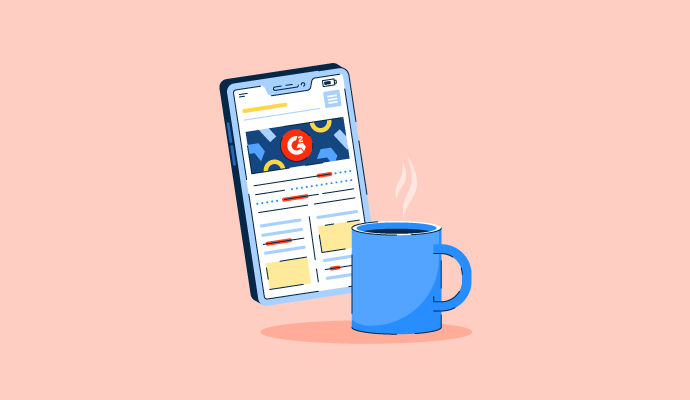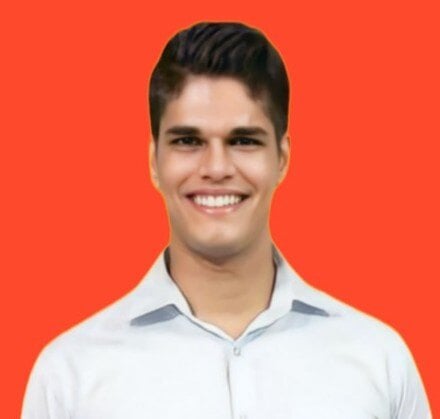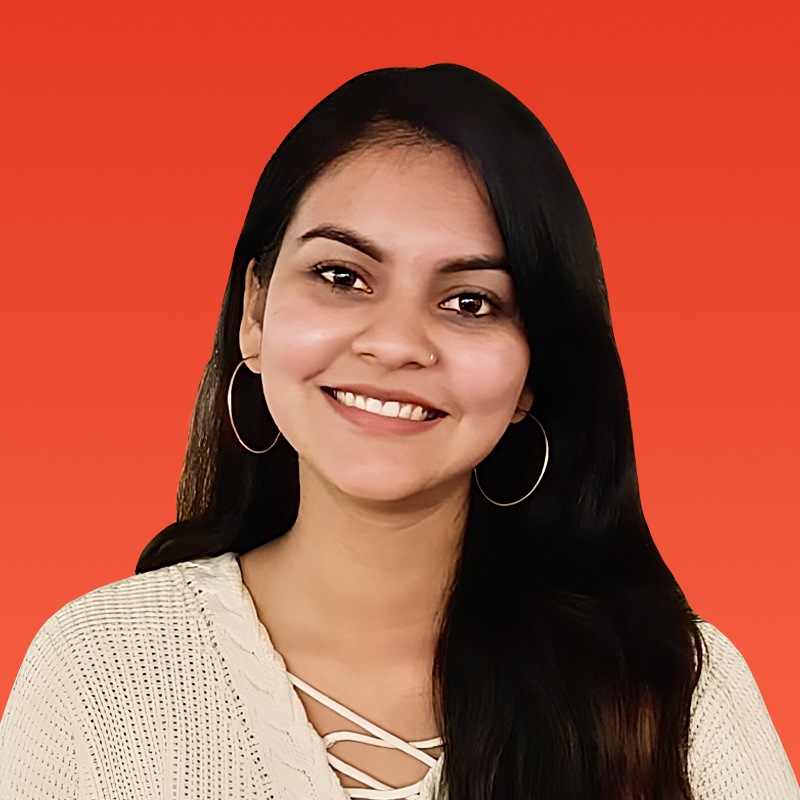December 11, 2024
 by Kamaljeet Kalsi / December 11, 2024
by Kamaljeet Kalsi / December 11, 2024

Data-driven storytelling is at the heart of winning customer love. But like Cupid’s arrow, it can either be a hit or an expensive miss.
To help you craft the perfect love story between data storytelling and brand, we interviewed Michael Kaye, OkCupid and ARCHER’s director of brand marketing & communications. Michael is a communications strategist and purpose-driven marketer recognized by Business Insider as a Top Tech PR Pro, PR Net's Marcomms Most Influential, PRWeek's 40 Under 40, and a Ragan Game Changer.
Dive in for a wealth of practical takeaways about fostering brand authenticity, amplifying queer representation, and standing out from the competition. Michael also shares some golden nuggets on robust localization and successful brand collaboration.
This interview is part of G2’s Professional Spotlight series. For more content like this, subscribe to G2 Tea, a newsletter with SaaS-y news and entertainment.
What's your favorite beverage?
An espresso martini.
What was your first job?
I was a camp counselor. I spent my childhood attending day camps, and in high school, I became a counselor in training (CIT). I continued as a camp counselor throughout high school and college, primarily working with boys in the first and second grades.
What's your favorite software in your current tech stack?
Currently, ChatGPT is the one that has transformed my workflow. Although I might be a bit of a late adopter, it has been invaluable. For my newsletter, Blurring The Lines, I conduct live interviews, record the audio, and then convert it into a transcript. Using ChatGPT to clean up the transcripts by removing filler words and repetitive content has saved me countless hours each week. It's truly been a lifesaver.
What problems at work make you want to throw your laptop out the window?
I haven’t faced this issue recently, but a major frustration comes from my communications background, particularly when dealing with storytelling alongside journalists. It's exasperating when headlines don't match the narrative we intended or when they're overly negative, yet such matters often lie beyond my control. As someone who likes to have control over every aspect, these situations can be quite challenging.
Can you tell us about your journey of becoming a brand marketing and communications leader for ARCHER and OkCupid?
Absolutely. I've been in this industry for about 10 years. I started with five years at various communications firms, working with clients across diverse sectors like global tech platforms, consumer goods, quick service restaurants, and entertainment systems. In 2019, I joined Match Group to lead PR for OkCupid in the U.S., which quickly turned into a global role. I launched the brand in countries like Australia, Germany, Israel, Turkey, and the UK.
Over the years, I took on more marketing functions, initially handling social media for OkCupid and then moving into creator and influencer partnerships. By 2022, I started working on ARCHER, Match Group's first LGBTQ+ specific dating app, which is a social-first platform for gay and queer men in the U.S. As head of brand, I now lead creator partnerships, communications, PR, brand partnerships, events, and social media for both apps.
Thinking back, my role has evolved significantly towards marketing, which was quite a big shift from my earlier career focus. When this transition began, I faced a lot of imposter syndrome, frequently questioning my own experience and fit for the role. But then I realized that at the heart of it, everything is about storytelling — whether through collaborating with a creator on a social video or engaging consumers at an event. That realization shapes everything I do now.
Since joining OkCupid, the brand has seen the highest volume of press ever, including a White House press release mention. What are some best practices you’ve harnessed to achieve global as well as home-ground success?
There are three key practices that have driven our success.
First is data storytelling. Unlike any other dating app in the world, OkCupid matches people on what matters to them through 1000s of in-app questions that have been answered more than 10 billion times since we launched. These questions cover topics related to dating, relationships, and sex but also highlight all the issues that are at the top of the minds of Gen Z and millennial daters. These insights really help me tell stories on a local, national, and global level with tailored angles for each market.
That leans into the second practice: localized, personalized narratives. Journalists today are not looking for a regurgitated press release; they want a story with a unique angle relevant to their specific audience. I can segment the data by people in New York City, Florida, France, etc. to uncover data-driven insights about how people are feeling not just about dating and relationships but also about culture and politics at a global as well as local level.
“All these best practices blend into each other. I don't think a story has to be one of them. A great story is all of them.”
Michael Kaye
Director of brand marketing & communications at OkCupid and ARCHER
The last piece is emotion. Our stories need to resonate on a human level. You might lean on the data to support your narrative, but what is the personal side of that data? We have to humanize the numbers.
Measuring emotion is a very difficult and delicate knack. How did you do that?
I'm actually going to go back to the data for the emotion piece because what's fascinating about our questions is that each one is optional. If people are answering a lot of questions about a given topic, it signals a connection they have with the respective topic because they don't have to answer it. Going beyond just answering our questions, users can rank how important a question is to them. These factor into our algorithm and how we connect people.
For example, while many people might love horror movies, the data signals help us understand layered information. For example, it might not be a big priority for them, or they might not have a big connection to that topic. But, what they do have a strong connection to is reproductive rights. This means a lot to many of our daters. The message becomes clear that daters don't want to be matched with someone who doesn't believe that people have the right to choose what to do with their own bodies.
Our data really does tell us a lot about human behavior and the emotional connections our daters have to these leading issues that are pressing for Gen Z and millennial daters.
We also actively engage with our daters. We don't sit in an office and never interact with our users. We're talking to daters on a monthly basis.
“People DM me asking for advice on dating or building a profile. There's lots of dialogue between our employees and the actual app users, which is amazing as they also help inform product features and brand campaigns. We have a really close connection to the people on our apps.”
Michael Kaye
Director of brand marketing & communications at OkCupid and ARCHER
How do you differentiate your communication strategy for ARCHER and OkCupid from its competitors like Grindr, Hinge, and Tinder? And from each other?
To differentiate our communication strategy for ARCHER and OkCupid, we focus heavily on product education. On ARCHER, every profile shows a face, which is a big difference from our competitors. Where they are all about anonymity and secrecy, we're about celebration and showing your truest self. OkCupid, on the other hand, uses extensive matching questions to match users based on what matters most to them.
“Everything we do tries to drive back to that USP and remind people why we're different from a product perspective.”
Michael Kaye
Director of brand marketing & communications at OkCupid and ARCHER
Our marketing and brand-building strategies for ARCHER and OkCupid differ in nuance as each brand has very different challenges.
ARCHER is a brand new app geared towards a niche demographic of gay and queer Gen Z and millennial men. Our main objective for ARCHER is first brand awareness and then brand affinity. Our strategy focuses on building brand awareness and affinity through both online presence and in-person events. Over the past year, we've tapped hundreds of creators and influencers, but we've also hosted and sponsored dozens of in-person events across the nation.
We've already tested our first brand integration on Ru Paul's Drag Race Global All Stars, and that activity actually drove double-digit growth and downloads the weekend our episode aired compared to the weekend before.
You'll notice that when you look at the marketing mix of what we're doing for ARCHER, it's hitting every possible lever. We're not just leaning into PR or creators; we have to do it all to make sure that when a gay man leaves his apartment in New York City, he sees us on a billboard, and then he opens Tiktok and an ARCHER ad comes up. And then, after work, when he goes to a gay bar with his friends, he sees ARCHER-branded napkins, and he's constantly seeing this brand name.
OkCupid is a completely different ball game. It is a 20+ year-old OG dating app with millions of users worldwide. Contrary to ARCHER’s niche demographic, OkCupid is literally for everyone, regardless of how they identify. For OkCupid, our challenge isn’t brand awareness but brand perception — being seen as a dating app for an older demographic.
When I joined OkCupid, I remember asking my younger cousin in her 20s, “Do you know OkCupid?” And she said, “Yeah, of course. I know OkCupid. It's a dating app for older people.”
Combating the association with an older demographic and targeting Gen Z and younger millennials is important because we want to keep bringing in younger users. We've been leaning into collaborations with brands that Gen Z and millennials love.
One of my favorite brand collabs happened most recently.
“OkCupid collaborated with the AI photo editing app Photoroom to create a tool called the Ex-Terminator. This was based on the insight we gained from users stating that about 6 in 10 (55%) Gen Z daters have photos where they want to erase a former partner.”
Michael Kaye
Director of brand marketing & communications at OkCupid and ARCHER
After a breakup, people often want to get back into dating. The problem is that their best photos include their ex, which isn't ideal for a fresh start on a dating profile. The Ex-Terminator tool lets people easily erase their ex from these pictures. Once that was done, people could dive back into the dating scene with their OkCupid ex-free profile. And it was such a strong campaign for us.

Source: OkCupid Blog
Was the spike in matches on OkCupid caused by the campaign launch. This growth was compared to the same month last year. The campaign was driven by PR, social media, and influencers.
OkCupid and Photoroom teams are in ongoing discussions for new plans for 2025.
We’re leaning into brand partnerships and building on the fandoms of other companies.
We're also speaking with a really big coffee chain here in the United States because 8 in 10 daters on OkCupid love coffee dates. So there's a lot brewing over here. Pun intended.
I think someone would have to be openly gay to be on the ARCHER app, right? Is there a way through your strategy or through ARCHER as an organization to support folks who are on that coming-out journey?
Our approach with ARCHER is indeed for people who are openly gay and ready to express their true selves. While this might not initially include everyone, we're committed to supporting those on their journey when they're ready.
To support this, we offer the ARCHER Health Hub feature, available both online and on social media. It's a resource aimed at educating and informing gay and queer men, regardless of where they are in their life journey. We created this to address the gaps our country’s education system has that are failing the LGBTQ+ community as a whole.
Each month, we feature new content focusing on crucial issues. Topics include coming-out journeys, living with HIV, diversity in dating, and coping with rejection. Written by both external contributors and myself, these pieces are formatted as “how-to” advice-driven articles to address tough, uncomfortable, real-life conversations.
OkCupid has been around for a while compared to its competitors. How do you keep the brand feeling fresh and relevant?
Besides the brand partnerships, our storytelling has been laser-focused on topics that our younger daters care about most. These include conversations around climate change, ethical non-monogamy, mental health, reproductive rights, etc. Being able to authentically connect our brand to these conversations has catapulted OkCupid back into the cultural zeitgeist of Gen Z and young millennials.
From being targeted as buyers to being the folks working behind brands and businesses, how have you seen the state of queer representation in marketing change?
There's definitely been progress, but there's also work to be done. There’s an incredible LGBTQ+ equality non-profit organization called GLAAD that works to shape the narrative and lead cultural change for the queer community through dynamic media. According to GLAAD’s 2023 report, LGBTQ+ people are still underrepresented in mainstream advertising. Queer people only appear in 3% of ads and receive less than 2% of screen time.
At OkCupid, and obviously, Archer, because that's an app for queer men specifically, we fully support the LGBTQ+ community, including non-binary and transgender users.
Over the years, I've really appreciated this about our company, especially OkCupid. It's technically a mainstream app, and we really believe there needs to be more trans inclusion in advertising and marketing.
We're proud to have worked with trans activists like Dylan Mulvaney or bisexual, gay, and pansexual models in our brand campaigns. It's our responsibility, especially when we're doing a brand campaign, to highlight all the beautiful identities of the daters we see on OkCupid.
All of us want to see ourselves reflected in a brand we love, a product we use, or a show or movie we watch. So I would say, yes, there's progress, but there's so much work that still needs to be done.
“Brands have a lot of power. Even if not all of us have huge marketing budgets, we do have marketing budgets and huge platforms. Corporations have a responsibility and an opportunity to truly shift and propel culture.”
Michael Kaye
Director of brand marketing & communications at OkCupid and ARCHER
Are there any consumer trends you’re seeing become prominent or emerge when it comes to consuming branded content? What is your advice to PR professionals and marketers in general right now?
Do the unexpected while staying true to your brand's identity. There’s a company I've been speaking with for the past couple of months about a partnership with OkCupid, and they are so far out of our typical realm of partnerships.
I remember going into that conversation saying, “This is going to be a waste of my time. I don't even know why I'm entertaining this call.” Fast forward 30 minutes, I left the call incredibly excited about what this partnership could become because it was so unexpected. And I think it's one of those moments where people are going to say, “What the hell are these two brands doing together?”
Such unexpected collaborations can captivate audiences and spark conversations. My advice to PR folks and marketers would be to make sure you're not aligning yourself with a company with drastically different morals and values. I wouldn't do that. But look beyond what people would really expect from a company within your given category.
“Do the unexpected, but stay authentic. Look beyond the obvious, but remain consistent with your core principles.”
Michael Kaye
Director of brand marketing & communications at OkCupid and ARCHER

Every Thursday, we spill hot takes, insider knowledge, and news recaps straight to your inbox. Subscribe here
Our CEO Godard has talked about imagining G2 as the place where software buyers and sellers fall in love, which makes me imagine a G2 version of OkCupid. What’s one feature you think G2 could take inspiration from OkCupid?
Our focus on localization and personalization is one key takeaway for G2 from OkCupid. This is not a feature but an approach. On OkCupid, a user's experience is tailored to their location, whether they're in New York, Berlin, London, Montreal, or Tel Aviv. We've developed localized matching questions for over 30 markets globally, making the app feel like a local product wherever you use it.
We engage with local teams to understand cultural nuances and incorporate these insights into our app. For example, in Israel, we have people on the ground that we're always talking to, who are our eyes and ears for what's happening in culture and politics. We bring those conversations and formulate them into questions for the OkCupid app. That's one part of OkCupid that I've always loved.
“This level of personalization, including tailored questions for queer communities, creates a deeply personal experience that I find remarkable and unparalleled in other tech products.”
Michael Kaye
Director of brand marketing & communications at OkCupid and ARCHER
What is your next career step? What are you striving toward or hoping to learn in the future?
As we speak, I just got this exciting news that we hit 1 million downloads for ARCHER within 1 year of launching, which is such an incredible milestone. I'm proud of everyone across product, finance, marketing, and data for this team effort.
My immediate focus is on achieving the next million downloads for ARCHER and cementing the brand in the gay cultural zeitgeist.
Personally, I have a strong passion for continuous learning. I hold a master's in strategic communications and have completed various certificate programs in communications and social media marketing. I'm eager to dive deeper into marketing to explore and experiment with AI.
My goal for 2025 is to broaden my expertise, develop and learn as a marketer, and see wherever my career takes me.
How do you balance it all and stay sane?
Balancing everything comes down to time management and sacrifice. I recognize that I can't do it all, so I'm comfortable saying no to certain things to ensure I can give 100% to what I choose to engage with. It's important to prioritize quality over sheer quantity in my commitments.
I also make it a point to carve out personal time, often surprising people with how offline I can be. Each week, I dedicate time to activities like SoulCycle, reading, listening to podcasts, or walking in Central Park. These breaks help me disconnect from work and recharge, maintaining my mental health and creativity. Amidst our always-online world, finding moments to be offline is crucial for staying balanced and sane.
What role has mentorship played in your journey?
I'm fortunate to have had really incredible mentors at every stage of my personal and professional journey. First and foremost are my grandparents, who are my adoptive parents. They created a life better than anything I could have ever imagined. My dad taught me the importance of a strong work ethic. I learned the value of networking through both my parents because they were always the most popular people I knew. I wouldn't be anywhere without them. Any new role, promotion, or award is dedicated to them. I always thank them first.
Over my career, I've been influenced by powerful women. Two come to mind. First is Maryam Ayromlou, a former colleague and Emmy-winning TV news senior producer turned communications executive. Maryam is currently the managing director of storytelling & content at Ruder Finn. She taught me so much about client management, expectation setting, and storytelling.
The second is Melissa Hobley, the chief marketing officer at Tinder. She's the former CMO at OkCupid, and she is the person who hired me here. We didn’t know each other prior, and Melissa has always been a fierce advocate for me. She helped pave a new career trajectory for me and has supported me on a personal and professional level for years. I've learned so much from her about personal branding and storytelling.
I've also learned about empathy and showing up for someone in the workplace beyond their traditional ways.
Melissa's dealt with aging parents at the same time that I've dealt with aging parents and has been a support system for me to lean on and navigate because, for someone my age with older parents, it can be a very isolating experience. She's been my shoulder to lean on which goes well beyond what her job description is. I learned a lot about empathy from her, too.
Follow Michael Kaye for the latest thought leadership in PR, branding, and marketing strategies.
If you enjoyed this insightful conversation, subscribe to the G2 Tea newsletter for the latest tech and marketing thought leadership.
Kamaljeet Kalsi is Sr. Editorial Content Specialist at G2. She brings 9 years of content creation, publishing, and marketing expertise to G2’s TechSignals and Industry Insights columns. She loves a good conversation around digital marketing, leadership, strategy, analytics, humanity, and animals. As an avid tea drinker, she believes ‘Chai-tea-latte’ is not an actual beverage and advocates for the same. When she is not busy creating content, you will find her contemplating life and listening to John Mayer.
It was in college that Sachin Gupta first realized the flaws with traditional skill assessment...
 by Sidharth Yadav
by Sidharth Yadav
Remember when the biggest PR crisis was a typo in a press release? Those days feel charmingly...
 by Tanushree Verma
by Tanushree Verma
In today's digital-first era, marketing has undergone a seismic shift, with social media and...
 by Tanushree Verma
by Tanushree Verma
It was in college that Sachin Gupta first realized the flaws with traditional skill assessment...
 by Sidharth Yadav
by Sidharth Yadav
Remember when the biggest PR crisis was a typo in a press release? Those days feel charmingly...
 by Tanushree Verma
by Tanushree Verma


